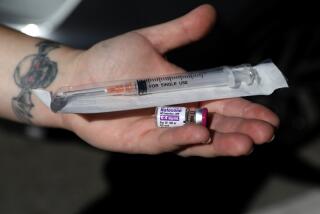A new way to help meth addicts stay clean: antibodies
- Share via
Designing medications and immune therapies that blunt a drug addict’s high and help him kick his habit is a promising idea. And someday soon it is expected to yield actual medications for addiction. But there’s a fundamental problem with prescribing an addict a daily medication that makes it impossible to get high: when the urge to use overwhelms the urge to quit — as it so often does — the struggling addict can easily discontinue the medication and go back to his illicit habit.
A new approach aims to prolong the effect of such anti-addiction medications and make it harder for recovering addicts to abandon their therapy. It would deliver genes into a methamphetamine addict’s cells on the backs of a dismembered virus, and prompt those cells to make a continuous supply of anti-meth antibodies.
Weeks or even months after getting a dose of medication, if the temptation to return to methamphetamine wins the day, a standing army of antibodies binds to the illicit drug and prevents it from reaching an addict’s brain.
No high, no rush of dopamine to the brain, no psychologiocal reward for using. Instead of descending back into addiction, the recovering meth addict gets another chance to stay clean.
A paper presented Tuesday at the annual meeting of the American Association of Pharmaceutical Scientists offered evidence that such a strategy could work. Molecular biologist Eric Peterson of the University of Arkansas described an experiment in which meth-addicted mice got an antibody therapy that continued to keep methamphetamine from reaching their brains 50 days after they got their dose.
The delivery system that made that long-lasting effect possible was an adeno-associated virus, engineered to deliver genes that produce antibodies that bind tightly to methamphetamine. Fifty days after injecting the mice with the virus, Peterson and a team led by graduate student Nisha Nanaware-Kharade gave the mice a dose of methamphetamine.
Half an hour and an hour after getting the meth, the mice that got the gene-based therapy had much more methamphetamine in their blood than did mice that got a saline shot instead. That suggests the meth — bound to the antibodies — never crossed the protective barrier into the brain and stayed sequestered in the bloodstream until it was filtered out.
The project, funded with grants from the National Institutes of Health and the National Institute on Drug Abuse, sought to integrate antibody engineering and gene therapy technology to generate an antibody-based medicine that could continue working for months or years, Peterson said. If the approach can be proved to work safely in humans, he said, it could protect recovering addicts from relapsing.
With methamphetamine addiction rampant in many parts of the country and no FDA-approved medication available to help addicts quit, medication therapies that prompt the immune system are showing promise. Similar therapies may help with addiction to cocaine and tobacco, but still need to be found safe, effective and long-lasting enough to help an addict through the tough early days of getting clean.
Follow me on Twitter at @LATMelissaHealy and “like” Los Angeles Times Science & Health on Facebook.
More to Read
Sign up for Essential California
The most important California stories and recommendations in your inbox every morning.
You may occasionally receive promotional content from the Los Angeles Times.














